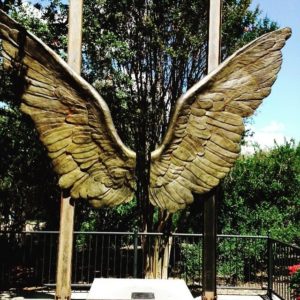How to honor the sacred + Blessed Michaelmas
He stands strong, firmly rooted in place, conferred with a sense of both gravity and purpose as he presses down on the Devil and brandishes his sharp and gleaming sword. Covered in full body armor, his face is cast down in concentration but also possessing something of Holy Mother – the strongest kind of kindness, the deepest sort of compassion. And then there are his wings, whether unfurled and pointed heavenward or down at his side, his wings remind us that in our hardest struggles we are never that far from grace, never too far from the breath of the Divine. This is an especially appropriate thought, for his very name means “one who is like God”, Archangel Michael.
When we honor Archangel Michael on his feast day of Michaelmas (September 29th) or any other day of the year, we often begin with the most basic questions: how do we honor this figure? How do we thank him for his aid and support? How do we request protection as we go forward through life? How do we say thank you? These questions are not limited to Archangel Michael; they are the exact same questions many of us ask whenever we are confronted with a Saint or an Angel, with a Holy Person from any tradition that resonates for us and that we feel connected to. We want to have a relationship with what is sacred to and for us, but how?
 First, we pay attention. Look at an image, in this case the image of Archangel Michael. Even in traditions where images are forbidden you will find all kinds of secrets in ornately embroidered patterns of swirling and twirling calligraphies. Look at the image. Say the name: Archangel Michael, let it roll off of your tongue and hear it resounding through your ears. What do you see and how do you feel, right here, right now?
First, we pay attention. Look at an image, in this case the image of Archangel Michael. Even in traditions where images are forbidden you will find all kinds of secrets in ornately embroidered patterns of swirling and twirling calligraphies. Look at the image. Say the name: Archangel Michael, let it roll off of your tongue and hear it resounding through your ears. What do you see and how do you feel, right here, right now?
Next, learn the stories. Remember the stories. Share the stories. So it is that we remember first that he is much older than any one religious system or tradition and much greater than any dogma. Next we hear that stern-faced Michael has always been the one to stand for those that no one else would stand for; that no one else would stand with. We remember that he was called by and attended to the sick and the dying who everyone else was afraid to touch. Called on by women who were battered and broken and alone with children – outcast from their tribes, their cities, and their communities. Called too by various, deeply persecuted religious minorities beginning with the ancient Israelites who loved him so much that they composed hymns and beautiful poetry in his name and for his honor. If his serene in-the-midst-of-battle face confuses us, might it help to remember that long before he was a warrior he was a healer and that maybe, just maybe in every war-torn heart there is the deepest ability not only to be healed but to heal others? Does he seem more real now?
Finally we listen, for truly more than gold, sacred smoke, and fine food, the greatest offering we can make is our time, our attention. What does Michael, Archangel and Saint, brother and beloved, ask you?
Does he speak to you of will – that virtue that has been forged in the fires of your life and polished with your tears and prayers until it gleams as surely as his sword does with your keen-eyed ability to judge and discern correctly?
Does he talk of boundaries – honoring the ones that you have set for yourself and the ones that have been created by others?
Does he tell about how it is to go into battle and stand up for the ones who are unseen, unheard, and often without hope?
Does he whisper that above all else you must do this: protect and nourish all that is tender, vulnerable, and still growing to full maturity?
Often in congregations or in individual practices intense time of honoring and offering spent with a holy figure ends with feasting and merriment. The feast is a reminder that we are embodied and that our precious bodies need to be honored too — that “spiritual stuff” is decidedly immanent. The merriment affirms that we are among friends and families, and it is in our relationships where we put what we have discovered into actual, living practice. May we all feast well, be blessed, and be blessings in turn.